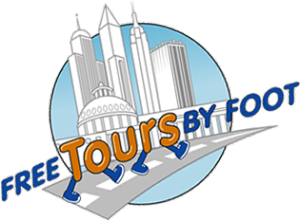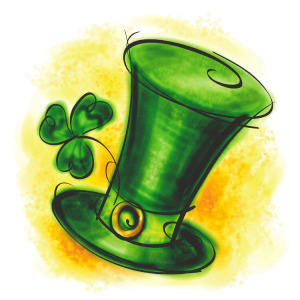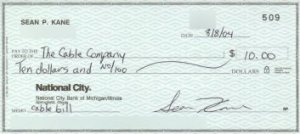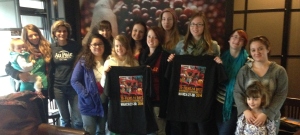 The Annapolis Film Festival starts this Thursday and runs through Sunday. There will be feature films and shorts, narratives and documentaries, panel discussions, and other great conversations with filmmakers. So cool to have this event in our “back yard”. Here is the schedule of all the Annapolis Film Festival events. http://annapolisfilmfestival.net/images/AFF2014-Schedule-Chart_online.pdf. For more information about this event visit www.annapolisfilmfestival.net.
The Annapolis Film Festival starts this Thursday and runs through Sunday. There will be feature films and shorts, narratives and documentaries, panel discussions, and other great conversations with filmmakers. So cool to have this event in our “back yard”. Here is the schedule of all the Annapolis Film Festival events. http://annapolisfilmfestival.net/images/AFF2014-Schedule-Chart_online.pdf. For more information about this event visit www.annapolisfilmfestival.net.
Monthly Archives: March 2014
Free Tours By Foot

As the weather becomes more inviting, you may want to visit other US cities. A great way to get a quick overview of a city is by going on a guided tour. Free Tours By Foot offer “pay what you like” tours of some of the greatest American cities. We have gone as clusters before on Free Tours By Foot in Philadelphia and Washington DC. Small group tours can also be arranged, or you can join an existing group. Check out www.freetoursbyfoot.com for more information.
St. Patrick's Day Parade and Activities

Lots of activity celebrating St. Patrick’s Day this year!
Here are links to information on Baltimore’s parade and Shamrock 5k, and Annapolis’ festivities.
Towson University – Spring 2014 Arts + Culture
Have you been wondering where you could go to see a performance, a film or an art exhibit?
Towson University has all of the above and more! You can check out their Spring 2014 calendar of events here.
Most of their events are FREE, and would make great outings for families and au pairs.
Here are some of the events happening in March and April:
Theatre
4/16: Mixed Media “a new musical” by Kristina Kauffman, 7:30 pm, Ruth Marder Studio Theatre
Music
4/2: Ellery Eskelin’s Trio New York, 8:15 pm, Recital Hall
4/11: Die Zauberflöte (The Magic Flute) by Wolfgang Amadeus Mozart, 7:30 pm, Stephens Hall Theatre
Dance
Ongoing through 5/17: TU Community Dance Classes, various days and times of the week, Center for the Arts
4/4 – 4/5: Dance Majors Performance Project, Dance Studio Theatre
Art
3/23: HARANA – The Search for the Lost Art of Serenade (2012), 5:30 pm, Recital Hall and Atrium, Center for the Arts
Film
11th Annual CLA International Film Festival
3/11: Screening of Favela Rising, 6 pm – 8 pm, College of Liberal Arts, LA 2310
3/27: Screening of Dream Land, 6 pm – 8 pm, College of Liberal Arts, LA 2310
4/3: Screening of The Square, 6 pm – 8 pm, College of Liberal Arts, LA 2310
4/3 – 4/5: 7th Annual International Women and Minorities in Media Festival, Van Bokkelen Auditorium, VB 204
4/5: Saturday Night Anime Series: “5 Centimeters Per Second”, 7pm, Media Center, MC 108
4/7: Sustainability Film Series: “TAPPED”, 7 pm, College of Liberal Arts, CLA 12o1
How to Address an Envelope
This is another common question, since the way people address mail around the world varies. Here is an image of where to put the information when you are sending mail in the United States.

How to address an envelope
Here is the address to mail your tax return to:
Internal Revenue Service
P.O. Box 1303
Charlotte, NC 28201–1303
U.S.A.
How to Write a check or Money Order
This question comes up from time to time and with the tax deadline approaching, I thought I would post a link with a great step by step tutorial. Click on the image of a check below to go to the tutorial on About.com.
Remember: Use pen and don’t leave extra blank space where someone can make changes.
If you don’t have a checking account and need to make a payment by check, you have two other options: money order or cashier’s check (bank check.) Money orders are available for purchase at your bank, the post office or the customer service desk of some retail stores (CVS, Safeway, WalMart.) You will be charged a small fee, $1.50-$5. Money orders need to be paid for with cash (not credit cards.) You will fill out the money order similarly to a check and keep your receipt portion for your records.
If you are paying your taxes:
- Make check or money order payable to “United States Treasury.”
- Write this info somewhere on the check:
- Your full name
- Your address and phone number
- Your Social Security Number
- 2013 Form 1040 NR-EZ
- Mail your tax forms (keep copies for your records) and payment to: Internal Revenue Service
P.O. Box 1303
Charlotte, NC 28201–1303
U.S.A.
14 Myths About Hosting an Au Pair
The au pair program is an enriching cultural exchange program for families and au pairs. Au pairs learn about American culture by living with an American host family. Host family children learn about other countries, cultures and languages. There a lot of misconceptions associated with au pairs. These range from assuming that au pairs are on a similar footing as nannies in terms of their responsibilities, and also includes the myth that au pairs are expensive, and out of the range of most families. These, and other myths, overlook the fact that au pairs are between the ages of 18 to 26 years old and are young people that participate in a cultural exchange with a family, whereby they provide light help around the house and with childcare for bed, board, and a small allowance. Before discussing common myths, below is a brief explanation about au pairs.
Au pairs are a child care alternative for families who want:
- In-home child care
- Bi-lingual child care
- Flexible child care
- Quality child care
- Intercultural child care
- Affordable child care
Au pairs are young adults from over 60 foreign countries participating in a cultural exchange program. They live with American host families for one year or longer. In exchange for room, board and a weekly wage of $195.75, au pairs provide up to 45 hours of flexible child care weekly, up to 10 hours daily. Agency program fees cover screening, travel fare to the U.S., medical insurance for one year, background checks, au pair attendance at 3 day workshop on child development and safety, and much more. Au Pair in America also offers host families in Anne Arundel County with children in school full time the option to select an EduCare companion who provides the family with 30 hours of child care per week at a cost of $286 per week. These costs are per family and not per child.
1 – MYTH: Au Pairs Are Expensive and reserved for the rich and famous
FACT: Au pairs are not just for the wealthy. Our families come from all walks of life and have a wide range of occupations. We have firefighters, teachers, nurses, doctors, lawyers, and pilots in our program. Our service is a tremendous help for families with twins or triplets, single parents and families with non-traditional work schedules. Au pairs are not paid a salary in the same way as a nanny, but instead receive their bed and board, and pocket money to cover expenses. On average a host family will pay an au pair $361.00 a week for 45 hours of care and $286 a week for 30 hours of care with the EduCare program. Our program is an economical option in comparison to hiring a nanny. Au Pair in America offers one flat rate per family not per child.
2 – MYTH: Au Pairs Don’t Work Weekends or Evenings
FACT: Au pairs have to follow the family schedule, so they may work on weekends and evenings. Au Pairs have one full weekend off each month, but they can work three other weekends. Au pairs are carefully screened and understand that flexibility and working full time is a requirement of the program. A family has the ability to customize the use of an au pairs hour per week according to their schedule, and unlike using a nanny or daycare, whose service is typically based on a set schedule, an au pair works when you need them.
3 – MYTH: Support is Not Available
FACT: Au Pair in America is part of the American Institute for Foreign Study and has received an A+ Rating with the Better Business Bureau. Check out the report here. Support is available from Au Pair in America, which covers everything from selecting the right au pairs, through to helping in the event of personal problems and disputes. Our business is all about personalized service and support. Our community counselors maintain monthly contact with host families and provide a social outlet for the au pairs in the area by hosting monthly cluster meetings to engage the au pairs in the local community. We pride ourselves on our excellent customer service and receive high marks on our customer satisfaction surveys. We rely on word of mouth referrals from our customers to make our business grow and many of our host families are repeat customers. All community counselors are within a one hour drive from their host families and there is always someone on staff 24/7 for emergencies at 1-800-927-7247. We also offer a monthly digital newsletter for our host families filled with the most recent up to date information.
4- MYTH: Au Pairs Will Have Poor English Skills
FACT: Au pairs must have a conversational level of English before they begin to work with a family. Au pairs are interviewed in their home country and their English is assessed using an International Test for English Proficiency developed exclusively for Au Pair in America by the Boston Educational Services measuring grammar, vocabulary, reading comprehension and written expression. However, the au pair may need assistance with verbal comprehension.
5 – MYTH: Au Pairs Will Be in the House Too Much & we will lose our privacy
FACT: Many families fear that having an au pair in the house will mean that they’ll lose their privacy, or that the au pair will take up too much personal space. In most cases, an au pair gains a social network outside of the house, and is often away during their personal days visiting friends. Au pairs take classes, make friends and develop a healthy social network.
6- MYTH: Au Pairs Act Only as a Babysitter
FACT: Unlike daycare or a babysitter, an au pair can perform all household duties associated with children, so they can vacuum a playroom, prepare and clean up after meals, do children’s laundry, make the children’s beds and organize their toys/closets/playrooms. An au pairs’ assistance with these day-to-day tasks allows you to spend quality time with your children and spouse after a long day at the office.
7 – MYTH: They let anyone into the au pair program.
FACT: Au Pair in America was the first legal au pair agency approved by the State Department in 1986. We recruit young ladies from over 60 countries worldwide. Because we care about providing the best childcare for our customers, we use our own staff overseas for recruitment, screening and orientation, instead of relying on third-party agents. During our screening process, the potential candidate is personally interviewed, tested on English competency, takes a personality profile, and submits to a criminal background check as well as personal and professional reference checks. Acceptance into our program is highly competitive.
8 – MYTH: Not having a native speaker will affect my child’s language development
FACT: Studies have shown that exposing your child to a second language enhances a child’s language and cognitive development and does not impede their ability to learn English. With an au pair you can have someone who speaks English and is also willing to teach their native language and share their culture with your family. Having this exposure can reinforce the language learning that your child has at school. Furthermore, foreign language taught in school can be reinforced at home with the au pair’s assistance!
9 – MYTH: Au pairs want to party, not care for children
FACT: Young adults need a healthy social life. Au Pair in America has a Code of Conduct that establishes au pair behavior guidelines. A Handbook and Guidelines for a successful year is provided to the au pairs that covers many topics and helpful tips for families and au pairs.
10 – MYTH: Au pairs don’t drive
FACT: Au Pair in America requires au pairs have a minimum of six months driving experience. Driving varies greatly among countries. Individual driving habits vary greatly among au pairs – from extreme overconfidence to extreme careful. All au pairs are to arrive to the United States with an international driver’s license. Au Pair in America has partnered with AAA, the nation’s most trusted name in driver safety and instruction to offer a custom classroom course specifically designed for au pairs. Exclusive to Au Pair in America, the AAA driving course is one of a kind, tailored to the needs of the international driver and specific to the safety needs of driving children in a car.
11 – MYTH: Au Pairs need a private bathroom.
FACT: Au Pairs do need a private bedroom but they may share a bathroom
12 – MYTH: Families who rent cannot have au pairs
FACT: Families who rent may host au pairs. However, au pairs must have a private bedroom.
13- MYTH: Single parents cannot host au pairs –
FACT: Single parent families may host au pairs.
14 – MYTH: Au Pair in America charges hidden costs and hidden fees
FACT: Au Pair In America program fees are transparent and flexible. The au pair program fess found on our website displays our fees, transparently detailing the total annual and average weekly costs. Au Pair in America also offers an Extended Payment Plan to help make program costs financially manageable.
Au Pairs excited to volunteer at the Annapolis Film Festival
 Au Pairs from the Annapolis cluster are getting very excited about volunteering at the Annapolis Film Festival that is scheduled to take place in downtown Annapolis March 27th through March 30th. Over 90 films from around the world will be featured over these 4 days. Last year over 5, 630 people attended this event and it is anticipated that close to 10,000 people will be here this year! Currently au pairs from Germany, Brazil, Hungary and Mexico will be volunteering in the four venues throughout Annapolis to ensure that all runs smoothly and that all guests have the best experience while they help promote and educate the populace that not only is Annapolis known for its sailing but also for the arts! For more information about this event please visit www.annapolisfilmfestival.net.
Au Pairs from the Annapolis cluster are getting very excited about volunteering at the Annapolis Film Festival that is scheduled to take place in downtown Annapolis March 27th through March 30th. Over 90 films from around the world will be featured over these 4 days. Last year over 5, 630 people attended this event and it is anticipated that close to 10,000 people will be here this year! Currently au pairs from Germany, Brazil, Hungary and Mexico will be volunteering in the four venues throughout Annapolis to ensure that all runs smoothly and that all guests have the best experience while they help promote and educate the populace that not only is Annapolis known for its sailing but also for the arts! For more information about this event please visit www.annapolisfilmfestival.net.
International Women's Day

Saturday March 8 celebrates International Women’s Day!
For more information on the history of this day, visit www.internationalwomensday.com.
This site offers all sorts of resources to learn more about women’s movements and initiatives worldwide – including articles, posters, pictures, videos, and much more. We are proud to be able to sponsor the amazing cross cultural home stay experience of Au Pair in America for some many young women across the globe!
Spring Forward Fall Back
 Daylight Savings time in the United States begins at 2.00am on Sunday morning. This means you move the clock hands forward by an hour when you go to bed on Saturday night. It is also interesting to note that time changes in other countries may not be happening this weekend. Most of Europe does not change until the last Sunday in March. For more information about the history and why we do this check out http://www.webexhibits.org/daylightsaving
Daylight Savings time in the United States begins at 2.00am on Sunday morning. This means you move the clock hands forward by an hour when you go to bed on Saturday night. It is also interesting to note that time changes in other countries may not be happening this weekend. Most of Europe does not change until the last Sunday in March. For more information about the history and why we do this check out http://www.webexhibits.org/daylightsaving
